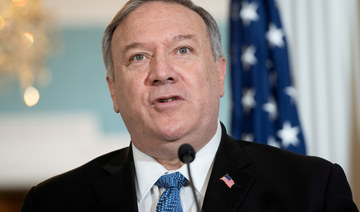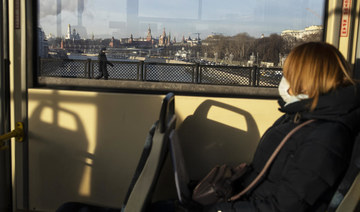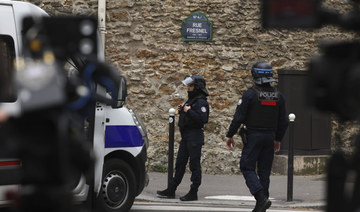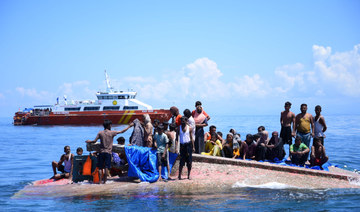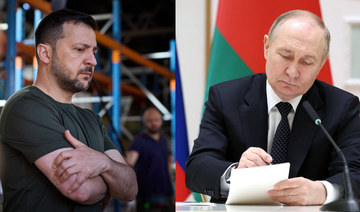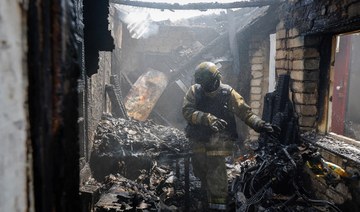MOSCOW: Russia has conducted around 10% fewer COVID-19 tests so far this month than the same period a month ago, despite a surge in recorded infections, official data shows, raising questions over authorities’ ability to control the spread.
Beyond affluent Moscow, people with COVID-19 symptoms can wait days to be tested and doctors sometimes refuse to test them altogether, according to Reuters interviews with patients, doctors and officials in 11 regions.
Rospotrebnadzor, the сonsumer health watchdog, ordered an increase in testing on Nov. 16 yet the number of tests conducted in the first half of December fell by 825,000, or 11%, compared with the first half of November, Reuters calculations using official data showed.
Rospotrebnadzor has since Nov. 16 allowed medical workers not to test people who have had contact with infected people but have no symptoms themselves, which analysts said could account for some of the decline.
The health ministry, Rospotrebnadzor and the national coronavirus crisis center did not respond to requests to comment on the reason for the drop in testing.
Two local officials and a doctor from the Central, Povolzhsky and Nizhny Novgorod regions respectively told Reuters on condition of anonymity that health care workers in the regions had been informally instructed by their managers or the local government to reduce testing due to a shortage of doctors.
The official from the Central region said doctors were required to refer patients with flu-like symptoms for testing under official rules but that in practice that was “impossible” due to the sheer numbers.
COVID-19 cases in Russia have surged since September, climbing to a record one-day high of over 29,000 on Dec. 6.
The Kremlin has resisted a second strict lockdown, saying measures in some regions limiting gatherings and mandating remote learning and work where possible and self-isolation for the elderly are enough.
’More tests means more cases’
Russia, the ninth biggest country by population, has reported more than 2.7 million cases, the world’s fourth-highest tally, and 47,968 deaths.
There were almost 50,000 more deaths recorded across Russia in October alone than in the same month last year, according to the state statistics service Rosstat. The Kremlin said the data required deep analysis.
Alexei Raksha, a demographer and a former adviser at the Federal State Statistics Service, said he believed the real COVID case figures were 10-15 times higher, basing his estimate based on various government data and search query statistics.
“All the official data on recorded cases can be thrown in the trash,” he said.
Boris Ovchinnikov, an analyst at research firm Data Insight, said he believes the reduction in testing is one of various tools used by authorities to “manage” the statistics.
“More tests means more cases,” he said.
Russia says it discloses all COVID-19 cases that it confirms in laboratories — considered the most reliable method. It is not the only country where people have reported difficulties accessing tests, but most are stepping up testing, seeing it as vital way to detect and limit the spread of the virus.
In Gusev, a town in western Russia, Margarita Yakutenko said she, her 56-year old mother, husband and three children all developed COVID-19 symptoms last month, but that medics declined to test them, referring them to their GP for regular treatment.
Her mother rapidly deteriorated and had a fever of 40 degrees, but was only tested on the eighth day of her illness when the hospital agreed to scan her lungs and diagnosed her with pneumonia, she said.
Her mother tested positive, was hospitalized and remained there weeks later. Her husband was tested 10 days after falling ill and his result was negative; the rest of the family were never tested, Yakutenko said.
In a village in Lipetsk region, Svetlana, a cleaner who declined to be identified by her surname, said doctors refused to test her even though she had a fever, cough and had lost her sense of smell — the three key symptoms of COVID-19.
She paid 1,300 roubles ($18) out of her 10,000 rouble monthly salary to be tested privately and her result came back positive.
Russia scales back COVID-19 screening amid surging cases
https://arab.news/w8gbt
Russia scales back COVID-19 screening amid surging cases
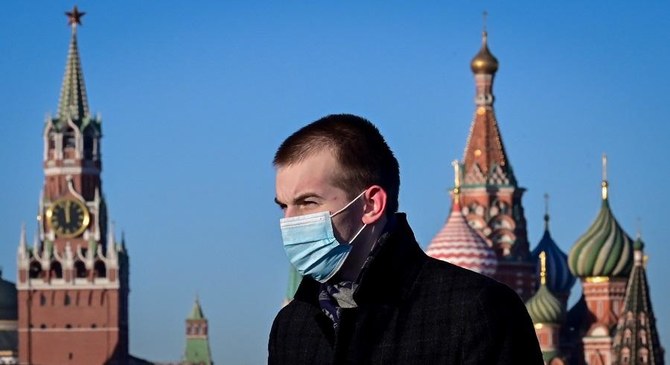
- Beyond affluent Moscow, people with COVID-19 symptoms can wait days to be tested and doctors sometimes refuse to test them altogether
- Russia, the ninth biggest country by population, has reported more than 2.7 million cases
Defense Secretary Lloyd Austin resumes duty after undergoing procedure at Walter Reed

WASHINGTON: Defense Secretary Lloyd Austin underwent a medical procedure at Walter Reed National Military Medical Center Friday evening and has resumed duty after temporarily transferring power to his deputy, Pentagon press secretary Maj. Gen. Pat Ryder said in a statement.
Austin is continuing to deal with bladder issues that arose in December following his treatment for prostate cancer, Ryder said.
The procedure was successful, elective and minimally invasive, “is not related to his cancer diagnosis and has had no effect on his excellent cancer prognosis,” the press secretary said.
Austin transferred authority to Deputy Secretary of Defense Kathleen Hicks for about two-and-a-half hours while he was indisposed, the Pentagon said.
The Pentagon chief returned home after the procedure. “No changes in his official schedule are anticipated at this time, to include his participation in scheduled Memorial Day events,” Ryder said.
Austin, 70, has had ongoing health issues since undergoing surgery to address a prostate cancer diagnosis. He spent two weeks in the hospital following complications from a prostatectomy. Austin faced criticism at the time for not immediately informing the president or Congress of either his diagnosis or hospitalization.
Austin was taken back to Walter Reed in February for a bladder issue, admitted to intensive care for a second time and underwent a non-surgical procedure under general anesthesia at the time.
The Pentagon has notified the White House and Congress, Ryder said.
More than 300 buried in Papua New Guinea landslide, local media says
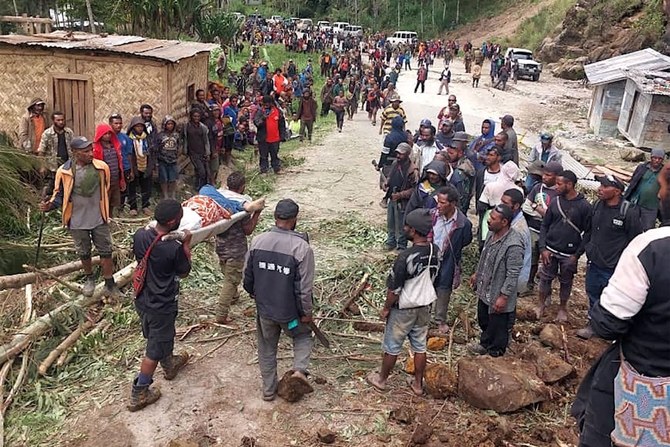
- Hundreds are feared dead in the landslide that hit Kaokalam village
SYDNEY: More than 300 people and over 1,100 houses were buried by a massive landslide that levelled a remote village in northern Papua New Guinea, local media reported on Saturday.
Hundreds are feared dead in the landslide that hit Kaokalam village in Enga Province, about 600 km (370 miles) northwest of capital Port Moresby, around 3 a.m. on Friday (1900 GMT on Thursday).
The landslide in the Pacific nation north of Australia buried more than 300 people and 1,182 houses, the Papua New Guinea Post Courier said, citing comments from a member of the country’s parliament, Aimos Akem. Akem did not immediately respond to Reuters request for comment via social media.
The Australian Broadcasting Corp. reported on Saturday that four bodies had been retrieved from the area after emergency teams reached the sparsely populated area, where the death toll is expected to rise.
The landslide has blocked highway access, making helicopters the only way to reach the area, the broadcaster reported.
Social media footage posted by villager Ninga Role showed people clambering over rocks, uprooted trees and mounds of dirt searching for survivors. Women could be heard weeping in the background.
Prime Minister James Marape has said disaster officials, the Defense Force and the Department of Works and Highways were assisting with relief and recovery efforts.
French court sentences 3 Syrian officials to life in prison in absentia for war crimes
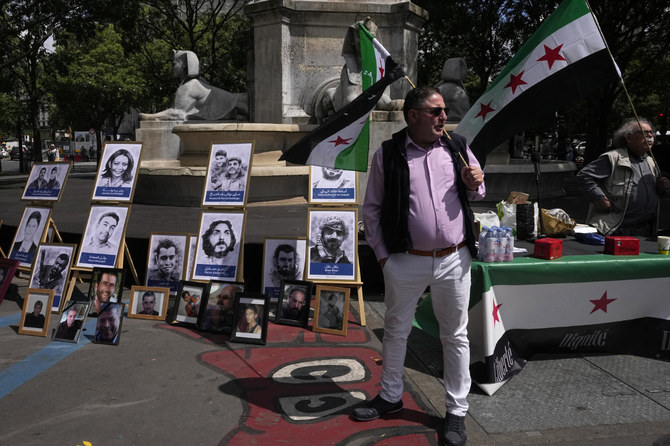
- The trial focused on the officials’ role in the alleged 2013 arrest in Damascus of Mazen Dabbagh, a Franco-Syrian father, and his son Patrick, and their subsequent torture and killing
- Former intelligence officials Ali Mamlouk, Jamil Hassan, and Abdel Salam Mahmoud are the most senior Syrian officials to go on trial in a European court over crimes allegedly committed during the country’s civil war
PARIS: A Paris court sentenced three high-ranking Syrian officials in absentia to life in prison Friday for complicity in war crimes in a landmark case against the regime of Syrian President Bashar Assad and the first such case in Europe.
The trial focused on the officials’ role in the alleged 2013 arrest in Damascus of Mazen Dabbagh, a Franco-Syrian father, and his son Patrick, and their subsequent torture and killing. The four-day trial featured harrowing testimonies from survivors and searing accounts from Mazen’s brother.
Though the verdict was cathartic for plaintiffs, France and Syria do not have an extradition treaty, making the outcome largely symbolic. International arrest warrants for the three former Syrian intelligence officials — Ali Mamlouk, Jamil Hassan, and Abdel Salam Mahmoud — have been issued since 2018 to no avail.
They are the most senior Syrian officials to go on trial in a European court over crimes allegedly committed during the country’s civil war.
The court proceedings came as Assad has started to shed his longtime status as a pariah that stemmed from the violence unleashed on his opponents. Human rights groups involved in the case hoped it would refocus attention on alleged atrocities.
Clémence Bectarte, the Dabbagh family lawyer from the International Federation for Human Rights, said the verdict was the “first recognition in France of the crimes against humanity of the Syrian regime.”
“It is a message of hope for all Syrian victims who are waiting for justice. It is a message that must be addressed to states so that they do not normalize their relations with the regime of Bashar Assad,” she said.
The trial began Tuesday over the alleged torture and killing of the French-Syrian father and son who were arrested at the height of Arab Spring-inspired anti-government protests. The two were arrested in Damascus following a crackdown on demonstrations that later turned into a brutal civil war, now in its 14th year.
The probe into their disappearance started in 2015 when Obeida Dabbagh, Mazen’s brother, testified to investigators already examining war crimes in Syria.
Obeida Dabbagh and his wife, Hanane, are parties to the trial along with non-governmental organizations. They testified in court on Thursday, the third day of the trial.
Obeida Dabbagh said he hoped the trial would set a precedent for holding Assad accountable. “Hundreds of thousands of Syrians have died. Even today, some live in fear and terror,” he said.
Despite the defendants’ absence, the trial’s significance was underscored by Brigitte Herremans, a senior researcher at the Human Rights Center of Ghent University. “It’s very important that perpetrators from the regime side are held accountable, even if it’s mainly symbolic. It means a lot for the fight against impunity,” she said.
Some 45,000 Rohingya have fled fighting in Myanmar: UN
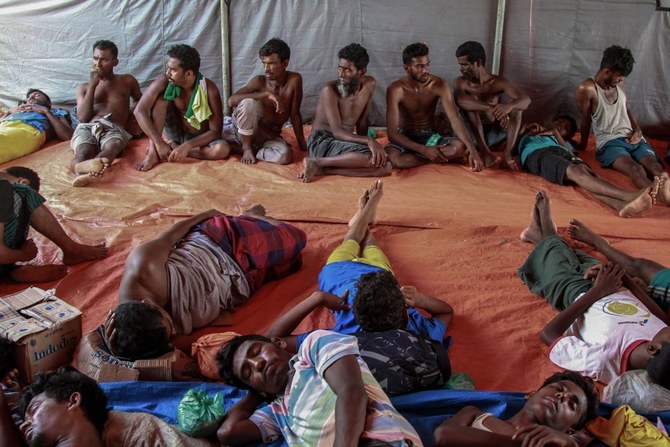
GENEVA: The United Nations warned on Friday that escalating fighting in conflict-torn Myanmar’s Rakhine State had forced around 45,000 minority Rohingya to flee, amid allegations of killings and burnings of property.
“Tens of thousands of civilians have been displaced in recent days by the fighting in Buthidaung and Maungdaw townships,” UN rights office spokeswoman Elizabeth Throssell told reporters in Geneva.
“An estimated 45,000 Rohingya have reportedly fled to an area on the Naf River near the border with Bangladesh, seeking protection,” she said.
Clashes have rocked Rakhine since the Arakan Army (AA) attacked forces of the ruling junta in November, ending a ceasefire that had largely held since a military coup in 2021.
The AA says it is fighting for more autonomy for the ethnic Rakhine population in the state, which is also home to around 600,000 members of the persecuted Rohingya Muslim minority.
Hundreds of thousands of Rohingya fled Rakhine in 2017 during a crackdown by the military that is now the subject of a United Nations genocide court case.
“Over a million Rohingya are already in Bangladesh, having fled past purges,” Throssell pointed out.
UN rights chief Volker Turk was urging Bangladesh and other countries “to provide effective protection to those seeking it, in line with international law, and to ensure international solidarity with Bangladesh in hosting Rohingya refugees in Myanmar,” she said.
James Rodehaver, head of the rights office’s Myanmar team, described the horrifying situation many were fleeing from.
He said his team had received testimonies and seen satellite images, online videos and pictures indicating that Buthidaung town had been “largely burned.”
“We have received information indicating that the burning did start on May 17... two days after the military had retreated from the town... and the Arakan Army claimed to have taken full control of the village.”
He stressed that the UN rights office was still working to corroborate that information, to clearly establish “who were the perpetrators.”
One survivor had described seeing dozens of dead bodies as he fled Buthidaung, while another had said he was among tens of thousands who fled the town only to find themselves blocked by the AA on the road west toward Maungdaw town.
Other survivors also said AA members had abused them and extorted money from them as they tried to make their way to Rohingya villages south of the town.
In the weeks leading up to the burning of Buthidaung, Rodehaver said the rights office had documented renewed attacks on Rohingya civilians by both AA and the military in northern Rakhine, including through air strikes.
The team had documented “at least four cases of beheadings,” he said, adding that they had determined with a high level of confidence that those were carried out by the AA.
Beyond Buthidaung, Throssell warned of “clear and present risks of a serious expansion of violence.”
She pointed to the beginning of a battle for Maungdaw town, where the military has outposts and where a large Rohingya community lives.
“In this appalling situation, civilians are once more victimized, killed, their properties destroyed and looted, their demands for safety and security ignored,” she said.
“They are again forced to flee their homes in a recurring nightmare of suffering.”
Zelensky says Ukrainian forces now control area where Russia pushed into Kharkiv region
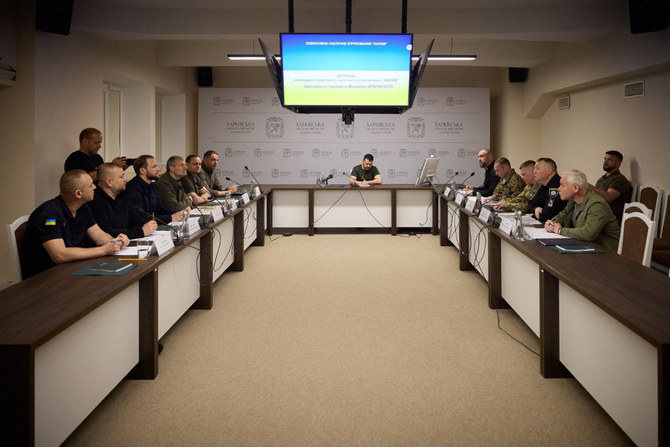
- A late-night report by the General Staff said Ukrainian forces had repelled 10 Russian attacks in the area, including around Vovchansk.
- Russian forces were using less infantry around Vovchansk and instead firing from a distance, with limited accuracy.
President Volodymyr Zelensky said on Friday that Ukrainian forces had secured “combat control” of areas where Russian troops staged an incursion this month in northern parts of Kharkiv region.
“Our soldiers have now managed to take combat control of the border area where the Russian occupiers entered,” Zelensky said in his nightly video address.
Zelensky’s comments, after holding a meeting of military and regional officials in Kharkiv, Ukraine’s second largest city, appeared to be at variance with comments by Russian officials.
Viktor Vodolatskiy, a member of Russia’s State Duma lower house of parliament, was quoted by Tass news agency as saying Russian forces controlled more than half the territory of the town of Vovchansk, 5 km (three miles) inside the border.
Vodolatskiy was quoted as saying that once Vovchansk was secured, Russian forces would target three cities in Ukraine’s eastern Donetsk region — Sloviansk, Kramatorsk and Pokrovsk.
Reuters was unable to verify independently battlefield accounts from either side.
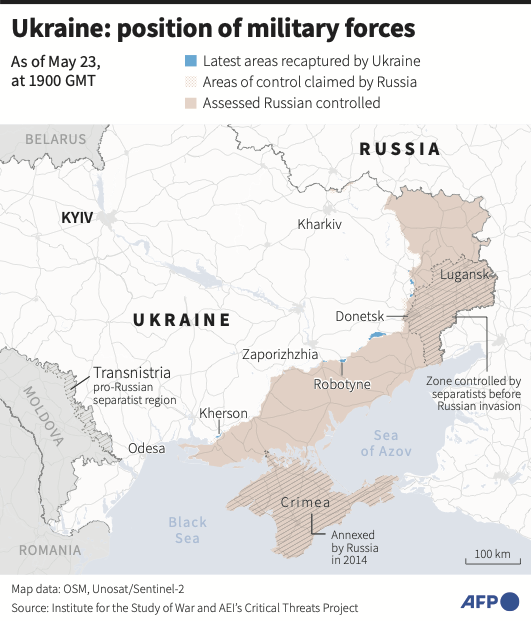
Russian forces pushed into border regions of Ukraine’s Kharkiv region this month and Russia’s Defense Ministry said they had secured control of about 12 settlements.
Zelensky and other Ukrainian officials had been reporting success in “stabilising” the area.
The Ukrainian military’s General Staff, in its evening report on Friday said the situation in Vovchansk was “tense but controlled by the defense forces.”
“The Russian army today launched air terror against this town — eight guided bombs hit the town,” it said. Attacks were launched on at least two other settlements north of Kharkiv.
A late-night report by the General Staff said Ukrainian forces had repelled 10 Russian attacks in the area, including around Vovchansk.
It also noted Russian forces had achieved “partial success” in areas near Kupiansk, further east in Kharkiv region, and the Pokrovsk sector where heavy fighting has been taking place further south in Donetsk region.
Ukrainian military bloggers said Ukrainian troops had been holding their ground around Vovchansk and Russian forces were using less infantry in the area and instead firing from a distance, with limited accuracy.



